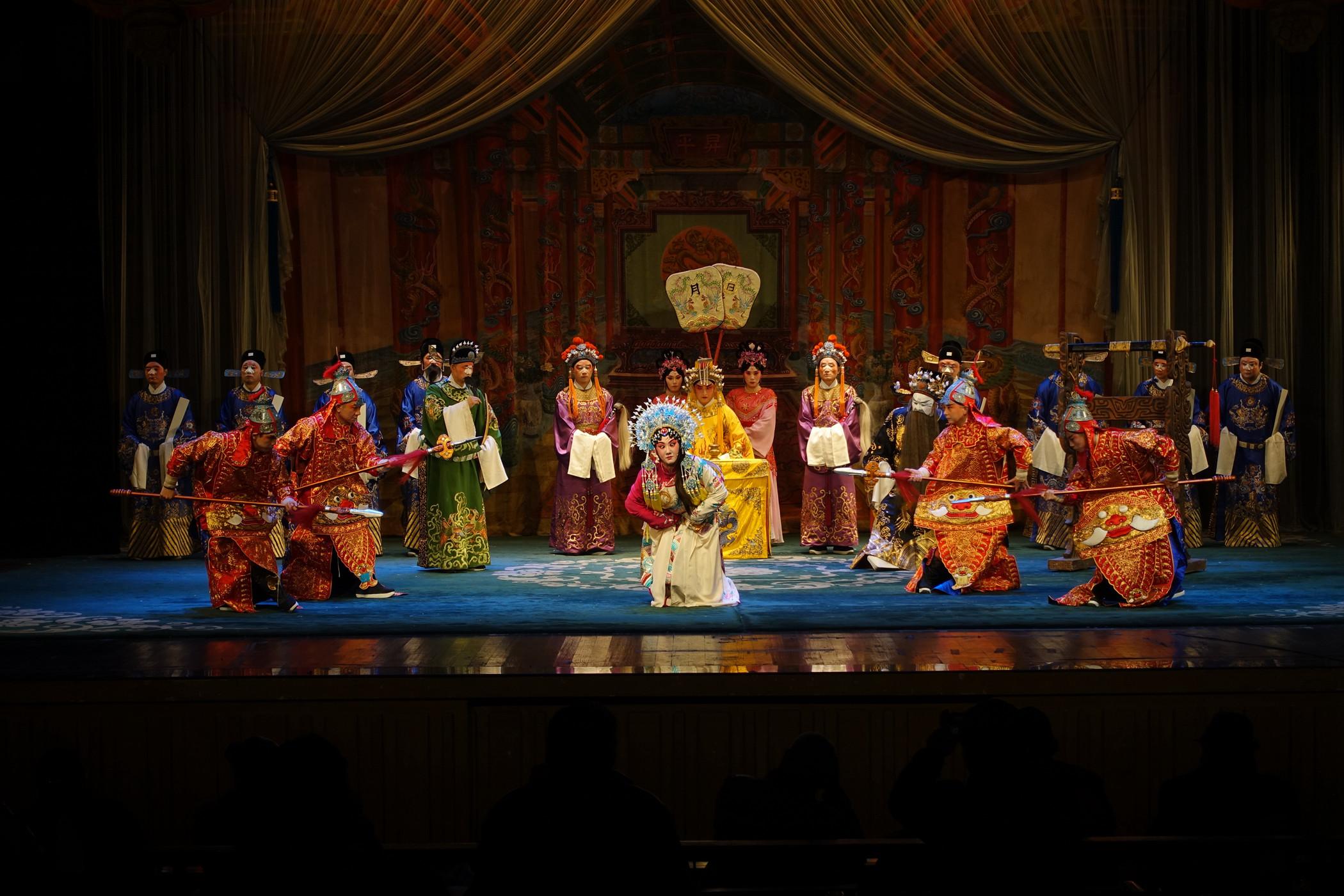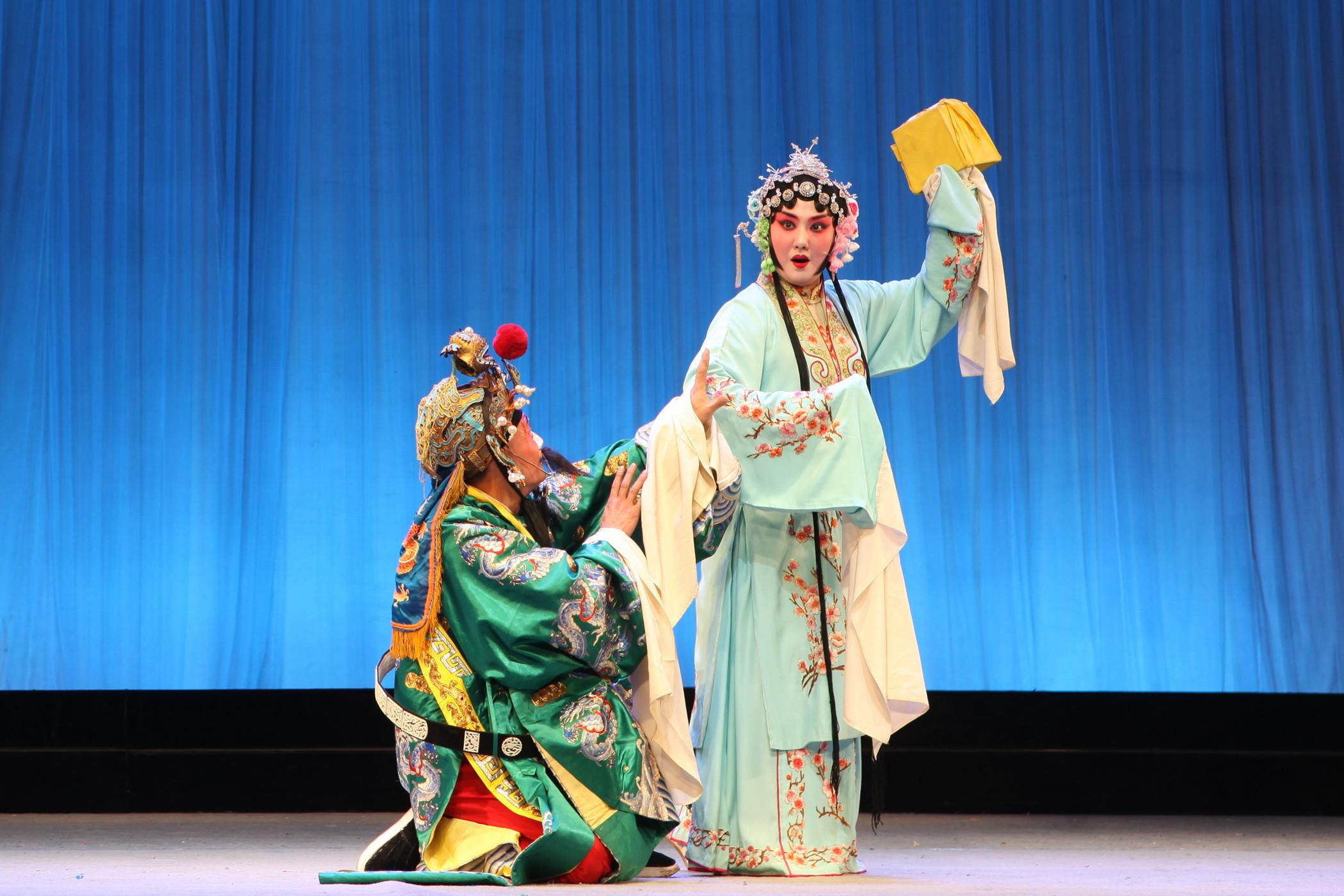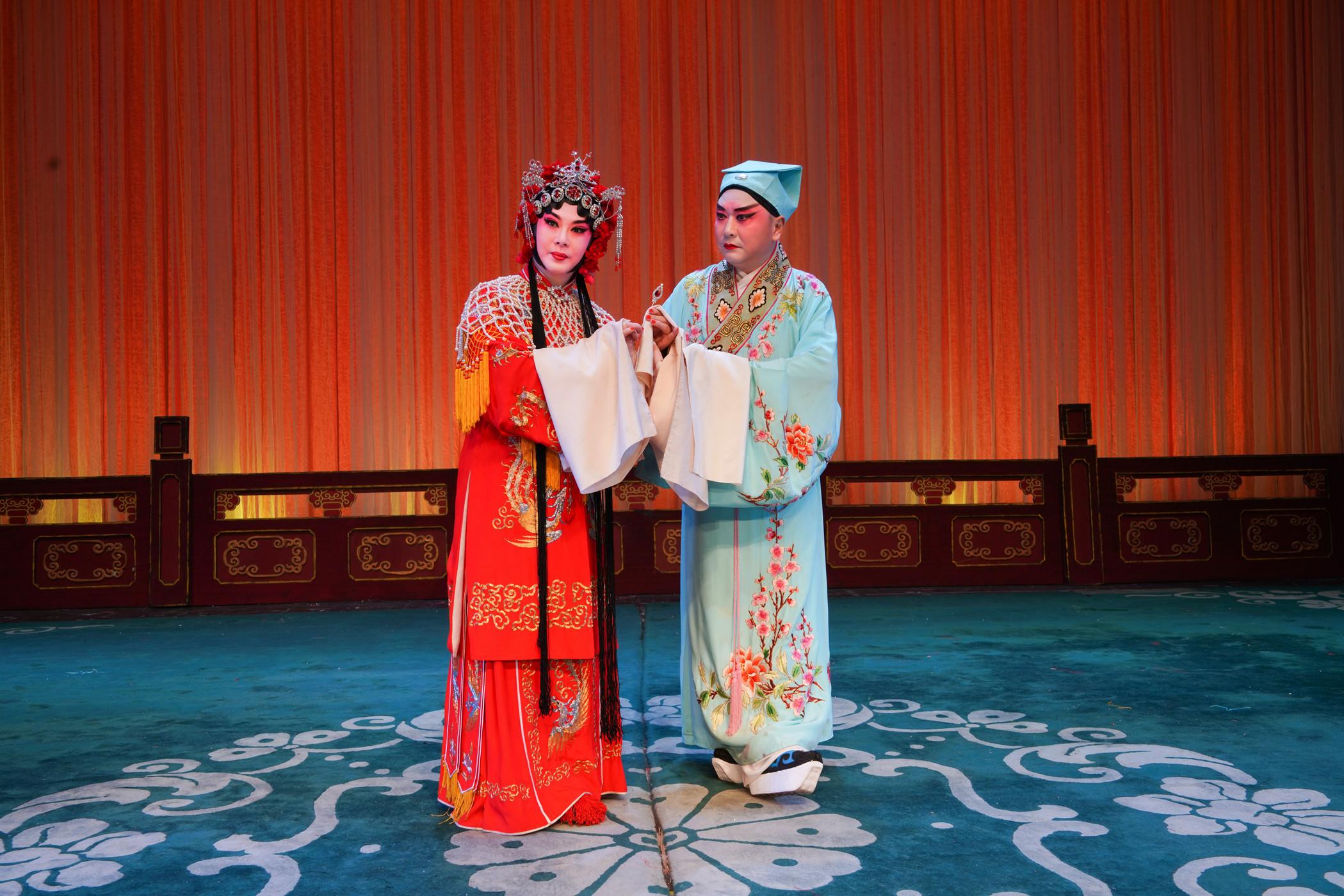Wuhan Han Opera Theatre to debut at Chinese Opera Festival in July to showcase the four-hundred-year glamour of melodious Han style (with photos)
******************************************************************************************
First known as "Chuqu" (songs of the south) or "Handiao" (Han tunes), and with a history of nearly four centuries, Han opera is one of the oldest forms of traditional theatre in China, and was inscribed onto the First National List of Intangible Cultural Heritage in 2006. It has a diverse collection of traditional repertoires, and most of them are based on historical stories and folk legends. Han opera also has an established system for 10 role types. Its prototype voice modes are the vigorous "xipi" and the lingering, delicate "erhuang".
The first performance will begin with a classic martial arts excerpt, "Waylaying the Horse", followed by "The Cosmic Sword", which has been the most popular Han opera play in the last decade. Adapted from a signature repertory of Chen Bohua, the play retains the two best-known excerpts, "Writing the Petition at the Zhao Residence" and "Faking Insanity at the Imperial Court", and features additional scenes including "Zhao-Kuang Alliance" and "Stealing the Sword and Framing Kuang" to enhance the overall coherence of the storyline. The second performance will feature a comedy excerpt, "A Novice Monk and a Young Nun Revoking Their Vows", and "Admonition by Suicide", a play composed of three excerpts. The first is "Crossing Yinping", which demonstrates the superb skill of a "shiza" (painted face) in Han opera. The second excerpt "Jiangyou Pass" features the "sidan" (virtuous female) role that the performer was trained by Hu Heyan, a National Intangible Cultural Bearer. The third excerpt, "Crying in the Ancestral Temple", highlights the arias sung in "fanerhuang" mode that are impassioned and poignant, and is well-known at home and abroad. The final performance of "When the Plum Tree Blooms Again" is a classic play of the Chen Bohua school of Han opera. Both the scenes "Praying to Plum Blossoms" and "Chastising the Minister" highlight the elegant demeanour and dignified disposition of the "qingyi" (virtuous female) role in Han opera, while the "Congtai" scene showcases the subdued and melodious "erhuang" tone of the Chen school.
Details of the three performances are as follows:
Date and time: July 7 (Friday), 7.30pm
-------------------------------------------------------
Excerpt "Waylaying the Horse"
Main cast: Wen Junhua, Hu Ziyu
Synopsis: While going on an expedition with the Yang army, Jiao Guangpu is stranded in hostile territory. He operates an inn at the Boundary Stake Pass, and always longs to return home but in vain. Twenty years later, Dowager She sends the eighth daughter of the Yang family, Yang Bajie, to sneak into the Liao kingdom to spy on the enemy's military activities. Disguised as a man, Bajie arrives at Guangpu's inn. Guangpu plans to steal the security pass she carries on her waist. The two end up fighting. On learning the truth, they ruefully acknowledge each other.
"The Cosmic Sword"
Main cast: Wang Li, Zhu Yong, Wang Jing, Xiong Guoqiang, Zeng Chun, Fan Qiong, Shan Qing
Synopsis: In the Qin Dynasty, Zhao Gao is the imperial tutor who harbours an ambition to usurp absolute political power. His treachery is opposed by Prime Minister Kuang Hong. Kuang possesses a "cosmic sword" bestowed by the late emperor that accords him the authority to execute wrongdoers without prior imperial permission. Zhao schemes to form an alliance with Kuang by marrying his daughter Zhao Yanrong into the Kuang family. Yet Kuang still refuses to collaborate with him. Zhao steals the "cosmic sword" and frames the Kuang family for a crime they did not commit, thus landing them in jail. Zhao then plans to offer his daughter to the younger Emperor Qin, hoping the emperor will in return bestow the "cosmic sword" on him. On realising her father's devious plot, Yanrong resolutely resists him and the emperor, embarking on the journey to find her husband.
Date and time: July 8 (Saturday), 7.30pm
-------------------------------------------------------
Excerpt "A Novice Monk and a Young Nun Revoking Their Vows"
Main cast: Sun Wei, Wang Xiaolu
Synopsis: Having grown up in the Xiantao Nunnery as a novice, a young girl from the Zhao family is unwilling to bear the harsh and lonely life of the order. Yearning for the secular world, she absconds. Meanwhile, the young monk Mengwu flees from the monastery in the mountain as he likewise cannot bear the austere life and loneliness there. When the two runaways meet along the way, they get on extremely well and share their thoughts. They make a pact to revoke their respective vows in order to be married.
"Admonition by Suicide"
Main cast: Wang Li, Xiong Guoqiang, Zhu Yong, Zeng Chun, Shan Qing, Mao Wei, Yi Chao, Yan Changlin
Synopsis: During the Three Kingdoms period, the Wei general Deng Ai is sent on a military expedition to Sichuan to overrun the State of Shu. Deng secretly leads his troops though the Yinping Trail to ambush the enemy garrison at Jiangyou Pass. Upon learning that Deng's vanguard is at their doorstep, the Shu General Ma Miao plans to surrender, a move his wife Madam Li vehemently opposes to no avail. Ma capitulates without resistance by handing over the city seal. Madam Li kills herself as the ultimate sacrifice for her state. The Shu emperor Liu Shan is terrified by the turn of events. His son Liu Chen, Prince of Beidi, attempts to convince his father to fight, but his pleas fall on deaf ears. Furious, Liu Chen returns to his palace and kills his wife and son. Then he goes to the Imperial Ancestral Temple to tearfully beg for forgiveness from his illustrious ancestors before committing suicide.
Date and time: July 9 (Sunday), 2.30pm
-------------------------------------------------------
"When the Plum Tree Blooms Again"
Main cast: Li Qing, Zhang Zhiwen, Wu Zhengguang, He Yu, Zhu Yong, Mao Wei, Shan Qing, Xiong Guoqiang
Synopsis: During the Tang dynasty, treacherous Prime Minister Lu Qi brings false charges against Mei Bogao to destroy him and his family. Bogao's son Mei Liangyu manages to escape by travelling incognito. He finds refuge as a servant at the home of Chen Risheng, a close friend of Bogao. One day, a strong wind blows, causing the plum flowers in full bloom to shed and scatter, reminding Risheng of the tragic fate of the Mei family. He is so disheartened that he wants to take a vow to become a Taoist monk. His anguish moves the gods, and the plum blossoms bloom once more. Risheng's daughter Chen Xingyuan happens to meet Liangyu. After questioning, she realises Liangyu is the scion of the Mei family. Risheng is overjoyed and betroths Xingyuan to Liangyu. At the malicious behest of Lu Qi, Xingyuan is decreed to be sent to the frontier to marry a barbarian as a peace offering. On her way to the border, Xingyuan meets with Liangyu at Congtai, where they get engaged and swear eternal love for one another, before finally committing suicide by leaping off a cliff.
Wuhan Han Opera Theatre was formerly the Wuhan Han Opera Troupe, first founded in 1962. Led by Chen Bohua, a leading virtuoso of the art form, the group has built a strong cast with the 10 main role types complete. Over the years, the group has contributed tremendously to the research, archive compilation and innovation of the traditional art form of Han opera. It was listed in 2013 as a major performing company for regional theatre at the national level. Many of its productions have won awards in national competitions, and some of them have been made into art films for Chinese traditional theatre and television series.
Three performances will be held at the Theatre of Ko Shan Theatre. Each performance will run for about two hours and 30 minutes, including an intermission of 15 minutes. Lyrics and dialogue are with Chinese and English surtitles. Tickets priced at $160, $220, $280 and $360 are now available at URBTIX (www.urbtix.hk). For telephone bookings, please call 3166 1288. For programme enquiries and concessionary schemes, please call 2268 7325 or visit www.cof.gov.hk/2023/en/han.html.
A Meet-the-Artists session entitled "The Regional Characteristics and Theatrical Features of Han Opera" (in Putonghua) will be held at 7.30pm on July 6 (Thursday) at AC2, 4/F, Administration Building, Hong Kong Cultural Centre. The speakers include Executive Producer of Wuhan Han Opera Theatre, Yan Xiaoyi, Wang Li and other cast members of the troupe, while Chinese opera researcher Chan Chun-miu and Director of the troupe Huang Lang will be the moderators. Admission is free with limited seats available on a first-come, first-served basis. Details can be found on the above-mentioned website.
Since its inception in 2010, the COF has curated quality operatic programmes with the aim of promoting the artistry and culture of Chinese traditional opera. COF 2023 will once again bring together an excellent line-up of Chinese opera troupes to stage nine quality operatic programmes covering a variety of theatrical genres, including Peking opera, Qu opera, Sichuan opera, Han opera, Cantonese opera, Wu opera, Kunqu opera and Yue opera, from June to October, showcasing the splendour of Chinese operatic art in all its glory. For more details, please visit www.cof.gov.hk.
Ends/Tuesday, June 6, 2023
Issued at HKT 11:00
Issued at HKT 11:00
NNNN







